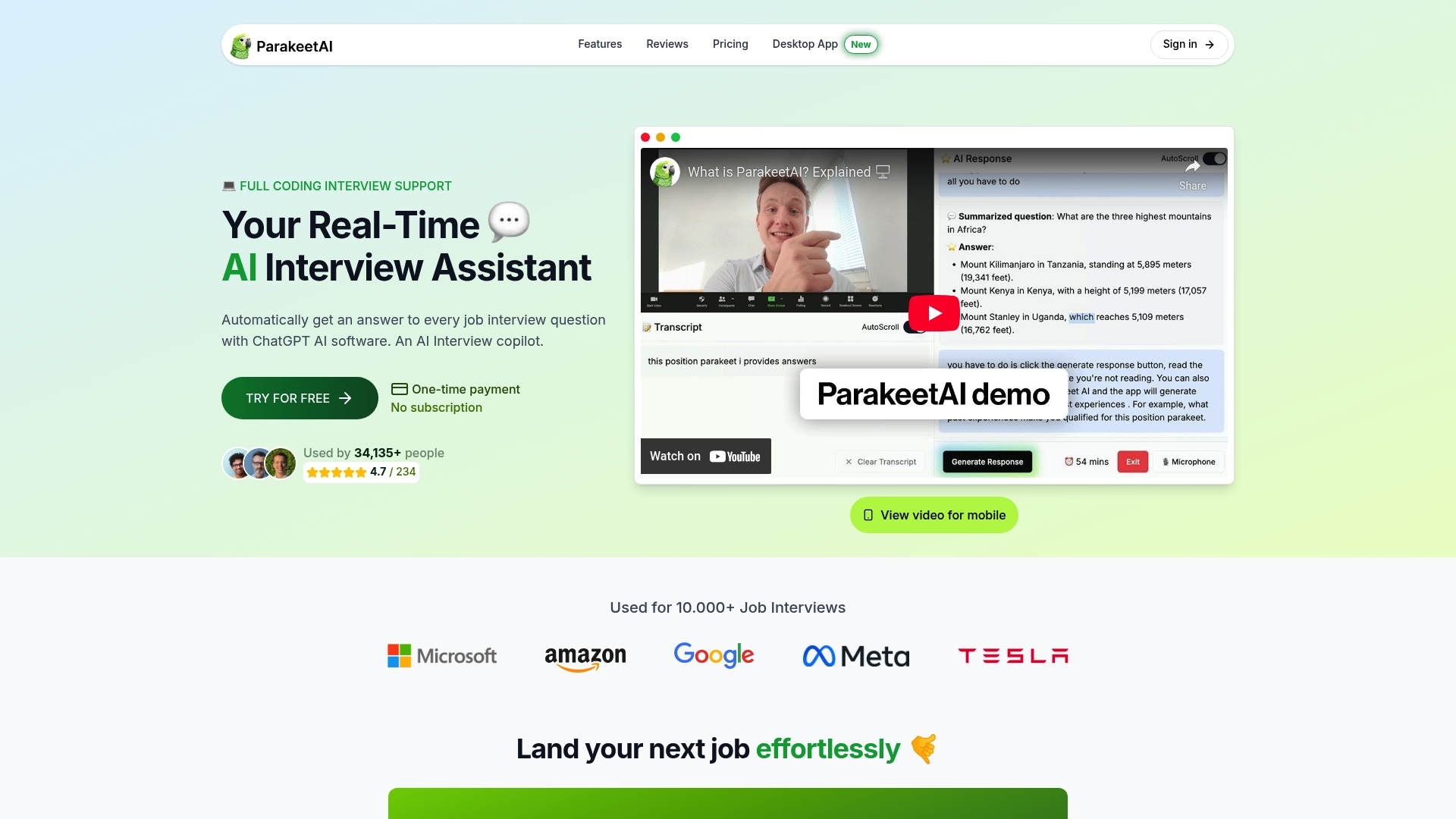Why AI Is Critical for Interviews: Complete Guide

Did you know that AI-powered interviews can reduce recruitment screening time by 67 percent? With companies searching for faster and fairer hiring, these advanced tools are changing how organizations find new talent. From instant feedback to minimizing hidden bias, AI aims to create more accurate and comfortable interview experiences for both employers and candidates, highlighting important benefits and raising fresh questions about fairness and ethics in the workplace.
Table of Contents
- What AI Interview Assistance Means
- How AI Enhances Interview Efficiency
- How AI Improves Fairness
- How Real‑Time AI Support Works
- Risks And Ethical Considerations
Key Takeaways
| Point | Details |
|---|---|
| AI Interview Assistance Enhances Hiring | AI tools automate recruitment, offering nuanced assessments through advanced algorithms and real-time feedback. |
| Efficiency Gains | Automating processes leads to faster candidate screening and standardized evaluations, allowing HR to focus on strategic tasks. |
| Improved Fairness | AI significantly reduces bias in interviews by applying objective scoring, although its perceived impersonality remains a concern. |
| Ethical Considerations | Implementing AI necessitates careful management of biases and privacy, emphasizing the need for human oversight and diverse training data. |
What AI Interview Assistance Means
AI interview assistance represents a sophisticated technological approach transforming traditional hiring processes by leveraging advanced algorithms and machine learning capabilities. According to research from Springer, these tools automate routine recruitment tasks while conducting virtual interviews through humanized AI interviewers designed to enhance candidate experiences.
At its core, AI interview assistance goes beyond simple screening. It uses complex algorithms to assess candidate responses, analyze communication patterns, and provide real-time feedback. Unlike traditional interviews, these AI systems can evaluate multiple dimensions simultaneously - from verbal communication to sentiment analysis, helping recruiters make more nuanced candidate evaluations.
The key capabilities of AI interview assistance typically include:
- Automated candidate screening
- Real-time language and communication analysis
- Personalized interview experience
- Reduction of human bias in initial interview stages
- Comprehensive candidate performance scoring
However, researchers caution that while powerful, these tools are not infallible. Role of AI Assistants in Interviews highlights that AI lacks complete human intuition and currently relies heavily on keyword-based assessments. Understanding these limitations is crucial for effective implementation.
How AI Enhances Interview Efficiency
AI dramatically transforms interview efficiency by automating complex recruitment processes and significantly reducing time-consuming manual tasks. Why Use AI for Interviews reveals that organizations can streamline candidate evaluation through intelligent technological interventions.
Research indicates that AI-driven interviews deliver highly consistent evaluations with remarkable precision. According to comparative studies, AI-human scoring correlations exceed 0.8, which means these systems can provide remarkably accurate assessments while eliminating human fatigue and subjective biases that typically impact traditional interviewing methods.
Key efficiency improvements include:
- 67% faster candidate screening
- Elimination of repetitive administrative tasks
- Real-time performance analysis
- Standardized evaluation criteria
- Reduced time-to-hire metrics
Moreover, AI interview technologies enable HR professionals to redirect their energy from routine screening to strategic talent acquisition. By automating initial interview stages, these intelligent systems free up human resources to focus on nuanced candidate interactions and high-level decision-making processes, ultimately creating a more dynamic and responsive recruitment ecosystem.

How AI Improves Fairness
AI introduces a powerful mechanism for reducing human bias in interview processes, offering a more objective approach to candidate evaluation. Understanding AI in Hiring Process demonstrates how intelligent systems can systematically minimize unconscious prejudices that often plague traditional hiring methods.
Research reveals remarkable improvements in fairness through bias-mitigating AI systems. A groundbreaking study showed that targeted AI interventions can reduce sentiment-driven bias by an impressive 41.2%, emphasizing skills and qualifications over emotional or subjective impressions. This approach directly counters long-standing challenges of human-led interviews, where personal biases can significantly impact candidate selection.
Key fairness advantages of AI-driven interviews include:
- Standardized evaluation criteria
- Consistent scoring across all candidates
- Removal of demographic-based decision-making
- Objective skills assessment
- Transparent evaluation processes
However, it’s crucial to acknowledge that fairness is nuanced. Research indicates mixed perceptions among applicants, with some viewing AI interviews as less personal or potentially dehumanizing. The most effective approach involves combining AI’s objective analysis with human empathy, creating a balanced evaluation process that respects both technological precision and individual human experiences.
How Real‑Time AI Support Works
Real-time AI support transforms interview experiences by providing instantaneous, intelligent guidance directly to candidates. Understanding the Benefits of Real-Time AI Interviews reveals how these sophisticated systems operate as invisible coaching companions, delivering adaptive support without interrupting the interview flow.
The core mechanism involves sophisticated algorithms that listen and analyze interviews in real-time, generating responsive prompts and suggestions within milliseconds. Research shows these AI coaches can provide instant answer frameworks, performance suggestions about pacing and tone, and strategic keyword recommendations—all while maintaining the candidate’s autonomy and natural communication style.
Key features of real-time AI interview support include:
- Sub-second response generation
- Invisible guidance overlay
- Performance coaching
- Communication style analysis
- Adaptive keyword suggestions
- Confidence-building prompts
What makes these systems truly revolutionary is their ability to provide nuanced, contextual support. Unlike traditional interview preparation tools, real-time AI assistance acts like an invisible mentor, helping candidates navigate complex interview scenarios while preserving their unique personal narrative and professional authenticity.
Risks And Ethical Considerations
AI interview technologies introduce complex ethical challenges that demand careful scrutiny and proactive management. Understanding AI in Hiring Process highlights the critical need for transparent and responsible AI implementation in recruitment processes.
Recent research reveals significant systemic bias risks in AI interviewing technologies. An Australian study warns that AI tools trained on limited data sets can inadvertently discriminate against non-native English speakers and individuals with disabilities, with transcription error rates reaching up to 22%. Cross-cultural research further demonstrates how language models can exhibit unconscious linguistic prejudices, favoring certain cultural communication patterns over others.
Key ethical risks in AI interviewing include:
- Potential algorithmic discrimination
- Lack of transparency in decision-making
- Unintended cultural and linguistic biases
- Privacy concerns with personal data processing
- Reduced human empathy in candidate interactions
- Limited understanding of nuanced communication
Addressing these challenges requires a multifaceted approach. Organizations must prioritize diverse training data, implement rigorous bias testing, maintain human oversight, and continuously audit AI systems to ensure fair, inclusive, and empathetic candidate evaluation processes. The goal is not to replace human judgment but to enhance it through responsible and ethical technological innovation.

Here’s a summary comparing AI interview assistance across efficiency, fairness, real-time support, and ethical risks:
| Aspect | Key Benefits | Main Challenges |
|---|---|---|
| Efficiency | Faster screening Consistent evaluations Reduced admin tasks |
Requires technical setup Potential data errors |
| Fairness | Bias reduction Objective scoring Standardized criteria |
Perceived as impersonal Possible residual bias |
| Real-Time Support | Instant feedback Performance coaching Adaptive suggestions |
Distraction risk Over-reliance on prompts |
| Ethical Considerations | Transparency Diversity support Human oversight |
Data privacy Algorithmic discrimination |
Transform Your Interview Experience with Real-Time AI Support
The article highlights key challenges in traditional interviews like human bias, time-consuming screening, and lack of personalized real-time feedback. If you want to overcome these roadblocks and gain an edge during interviews, embracing a real-time AI assistant is the solution. Imagine having an intelligent system that listens, analyzes, and provides instant, tailored answers and coaching to help you perform your best while reducing anxiety and uncertainty.

Discover how you can revolutionize your interview preparation and in-the-moment responses by trying our cutting-edge technology at Parakeet AI. Don’t let bias or inefficiency hold you back. Take control now with a trusted real-time AI job interview assistant that automatically suggests answers to every question using AI. Visit Parakeet AI landing page to get started today and advance confidently toward your dream job.
Frequently Asked Questions
What is AI interview assistance?
AI interview assistance refers to advanced technologies that automate recruitment tasks and conduct virtual interviews using humanized AI interviewers, enhancing candidate experiences and evaluations.
How does AI improve interview efficiency?
AI enhances interview efficiency by automating candidate screening, providing consistent evaluations, reducing administrative tasks, and streamlining the hiring process, allowing HR professionals to focus on strategic interactions.
In what ways does AI promote fairness in the interview process?
AI promotes fairness by using standardized evaluation criteria, delivering consistent scoring, minimizing demographic-based decision-making, and focusing on objective skills assessment, thus reducing human bias in hiring.
What are the ethical considerations of using AI in interviews?
Key ethical considerations in AI interviews include the risks of algorithmic discrimination, lack of transparency in decision-making, potential cultural biases, privacy concerns, and the need for human oversight to ensure empathetic interactions.




